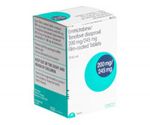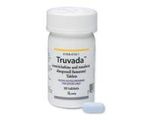The abbreviation HIV stands for Human Immunodeficiency Virus. The virus is sexually transmitted and therefore falls into the category of STDs. Without treatment, the virus breaks down the immune system. As a result, the body becomes increasingly vulnerable to pathogens. This means that rapid treatment is absolutely necessary. There is no cure for HIV, but medication can prevent the condition from developing into AIDS.

HIV
Treatments
- All treatments
- Prescription medicines
- Non-prescription medicines
- Relevance
- Name A-Z
- Name Z-A
- Price low-high
- Price high-low
How does Dokteronline work?
At Dokteronline, you can get expert advice from doctors quickly, without the hassle of visiting your GP’s surgery. Take care of your health with reliable treatments and information from the comfort of your home.
Select your preferred treatment
The doctor will review your medical request
The pharmacy will ensure your medication is delivered to your doorstep
What is HIV AIDS?
HIV is caused by a so-called retrovirus. The virus attacks the immune system by destroying certain types of white blood cells (CD4+ T lymphocytes). Without these cells, the body can no longer defend itself against infection.
HIV is a dangerous STD. In the beginning, the condition causes mild symptoms that will pass on their own. After that, the virus remains dormant in the body for a long time. During this period, the immune system is increasingly weakened. This phase can last for months or even years.
Left untreated, HIV leaves the body susceptible to a variety of serious conditions, including cancer, dementia, and severe infections such as pneumonia. At this stage, HIV is referred to by doctors as acquired immunodeficiency syndrome, or AIDS.
HIV symptoms
As with many other STDs, many people do not notice an HIV infection at first. The first symptoms only appear after a few weeks. HIV develops in stages. Below is a list of the most common HIV symptoms per phase.
First phase: acute HIV
Symptoms start about 1 to 6 weeks after infection. The body starts to fight the infection. This phase is also known as 'acute HIV'.
Acute HIV symptoms in men and women:
- Flu-like symptoms, such as fever, sore throat, muscle pain, headache, fatigue;
- Swollen glands;
- Skin rash;
- Diarrhoea;
- Night sweats;
- Rare symptoms include ulcers on the mucous membrane of the mouth or on the genitals;
- Some people have no symptoms at all.
Acute HIV symptoms disappear after a few days or weeks.
Second stage (latent stage)
The virus continues to proliferate, but this usually goes unnoticed. However, the contagiousness of the virus continues. The virus can therefore be passed on to others undetected. This phase can last up to 15 years.
Third phase: HIV becomes AIDS
By this phase, the immune system is severely damaged. The body is therefore susceptible to all kinds of infections and disorders. The disease is no longer called HIV as it has developed into AIDS. The symptoms vary greatly from person to person.
Advanced HIV symptoms in women and men
Symptoms of an advanced HIV infection include:
- Weight loss;
- Shortness of breath;
- Persistent fatigue.
In this phase, infections and other diseases also occur more quickly, such as:
- Candida infections;
- Pneumonia;
- Herpes simplex virus infections;
- Tuberculosis;
- Cervical cancer;
- Lymph node cancer.
Because the immune system can no longer fight these infections, these can become life-threatening conditions for untreated AIDS patients.
HIV causes
HIV virus particles are found in pre-cum, semen, vaginal fluid, breast milk and blood. You can therefore become infected with this STD if you have unsafe sex but HIV can also be spread through blood contact, for example, when using a hypodermic needle or razor blade with contaminated blood on it. This can also happen if a partner has a wound that comes into contact with contaminated body fluids.
Who is HIV contagious for?
People with many sexual partners run an extra risk of contracting this STD. HIV is most common in men who have sex with men. The majority of infections occur in this group because HIV is much more easily transmitted through anal sex than through vaginal sex. But women and straight men can also get HIV.
HIV is also more common in certain areas, including Asia, Africa, parts of South and Central America, Eastern Europe and Russia.
Preventing HIV
Because HIV is contagious, safe sex is very important. Always use a condom.
If you run a high risk of contracting HIV, there are medicines that help prevent infection. These drugs are called PrEP (Pre Exposure Prophylaxis). PrEP drugs are virus inhibitors.
There are also rapid medications that can be used in emergencies (maximum 72 hours after a possible infection), in the event of a broken condom for example. These drugs are called PEP: Post Exposure Prophylaxis. These medicines also contain of virus inhibitors.
PrEP and PEP medications are only prescribed in certain cases.
Testing for HIV
HIV can only be detected in the blood three months after transmission. This has to do with the time it takes for the body to produce antibodies. As with any virus, the body makes antibodies against it. Unfortunately in HIV, the antibodies cannot eliminate the virus. The presence of antibodies shows that you have HIV. The symptoms of acute HIV are very similar to those of the flu, this makes it often difficult to recognise the disease which is what makes HIV so dangerous. You can quickly determine or rule out a possible infection by doing a HIV test.
When to get an HIV test?
If you have HIV symptoms, get yourself tested as soon as possible, but keep in mind that HIV is only detectable 2 weeks to 3 months after infection. Do take a test as soon as possible if you have regular unprotected sex and are at higher risk for HIV and/or another venereal diseases. Always get a HIV test (after three months) if you have had unprotected sex with someone infected with HIV. You can go to a doctor for a HIV test. The doctor will take a blood sample and have it examined in a laboratory.
HIV self-tests are also now available. If the result of your HIV test is negative, but you continue to experience symptoms or do not trust the test result, you should consult a doctor as soon as possible.
If the result is positive, seek treatment immediately, even if you don't have any HIV symptoms yet or they appear to be subsiding. If you have contracted the HIV virus, there is a chance that you also have another venereal disease. It is therefore wise to test yourself and your partner(s) for other STDs.
What to do if you have HIV
HIV must be treated immediately to prevent the virus from causing serious damage. You should also inform any sexual partner(s) immediately; they will also have to be tested as soon as possible.
HIV treatment: is there an HIV cure?
HIV can now be treated well with medication. HIV treatment cannot cure the disease but medication ensures that the immune system will not be broken down further. With proper treatment, HIV patients usually have an average life expectancy. It is important that any medication is taken responsibly and regularly. HIV medication must be used daily for the rest of the patient’s life.
In the event of a HIV infection, treatment with virus inhibitors will be given. These drugs stop the virus from multiplying. As a result, the number of virus particles in the blood decreases. If this so-called 'viral load' becomes so low that it is invisible, the virus can no longer be passed on. The HIV infection is then no longer contagious and usually won’t become contagious again as long as medication is taken properly.
There are different types of HIV inhibitors. They all deal with the virus in a different way. That is why HIV treatment usually consists of a combination of three different HIV inhibitors. Commonly used HIV inhibitor types are:
Nucleoside Reverse Transcriptase Inhibitors (NRTIs)
- Tenofovir;
- Abacavir;
- Zidovudine;
- Lamivudine;
- Emtricitabine;
- Didanosine.
Non-nucleoside reverse transcriptase inhibitors (NNRTIs)
- Efavirenz;
- Nevirapine;
- Etravirine;
- Rilpivirine.
Protease Inhibitors (PIs)
- Atazanavir;
- Darunavir ;
- Ritonavir ;
- Fosamprenavir;
- Saquinavir;
- Tipranavir;
- Indinavir.
CCR5 inhibitors
- Maraviroc;
- Raltegravir.
Fusion Inhibitors (Entry Inhibitors)
- Enfuvirtide.
A doctor determines which combination of drugs is best to use. There are also medicines in which several HIV inhibitors are combined in one pill.
Sometimes the virus turns out to be resistant to a certain drug. A different combination can then be prescribed instead.
Important information about HIV treatment:
Keep the following in mind when undergoing HIV treatment:
- Virus inhibitors can cause side effects. For example, you may suffer from symptoms such as nausea, diarrhoea, headache or fatigue. Long-term symptoms include nerve pain in the hands and feet, diabetes and abnormalities in the blood. Consult a doctor if the side effects are severe or do not diminish;
- Take the medication responsibly according to your doctor's instructions. This is very important; if you do not take the medicines on time, the virus can become resistant to treatment. Make sure you also keep this in mind when travelling, entering winter or summer time or if you want to fast during Ramadan. The leaflet will also tell you what to do if you forget a pill, or if you have vomiting or diarrhoea;
- HIV medication does not protect against other STDs so always use a condom during sex.
Do you have questions about HIV and AIDS or about your HIV treatment? A doctor or pharmacist will be happy to help you.
HIV/PrEP/PEP prescription drugs
Medicines against HIV require a prescription in most countries. This also applies to medication that prevents HIV (PrEP/PEP). You can request a suitable course of treatment at Dokteronline. Your application will be assessed by a doctor based on the medical questionnaire you have completed. A written prescription will then be forwarded to a pharmacy, after which the prescribed medication will be discreetly delivered to your home.
Would you like more information about the medicines against HIV? Consult a doctor or pharmacist.

